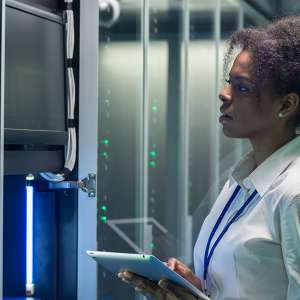The coronavirus pandemic has had an impact on almost every part of the U.S. economy. It has not, however, changed the need for maintaining security for data and confidential information during this difficult time. Hospitals, schools and other businesses depend on data centers to manage the safety and security of their data and to accommodate changing needs and processes that have been put in place because of COVID-19 concerns. Here are some of the most important elements of data security and how they work together to maintain the flow of communication while keeping information safer during the pandemic.
Encryption
As its name suggests, encryption is the way in which information can be transferred from its origin point to a destination without being readable by others along the way. This process uses a secret key to encode and decode data while keeping it safe from prying eyes and interception along the way. For schools communicating with students during this crisis and healthcare providers who must move to remote diagnosis and treatment of their patients, encryption is the first line of defense against the disclosure of confidential information during the communication process.
SSL Certificates
Secure Sockets Layer (SSL) certificates are used to authenticate the security of a website and to provide encryption for information exchanged between end users and owners of those websites. SSL certificates demonstrate with authority that the website is indeed owned and operated by the organization it presents as its owner. The SSL process uses a cryptographic key to verify the actual ownership and must be kept current to provide this assurance to users. Sites without this key are likely to be less trusted by users and less likely to function as they are intended.
Multi-factor Authentication
For highly sensitive information like financial or medical data, multi-factor authentication ensures that only those end users authorized to access this information are allowed to view or alter it. The components of multi-factor authentication typically include some or all of the following:
• A password or PIN
• A location, such as an IP address or LAN network
• Biometric information that may include fingerprints, voice or face recognition or iris prints
• Security tokens
• One-time codes sent through email or text to a mobile phone
Implementing multi-factor authentication methods for all users or for only those who request it will allow organizations and companies to provide the added protection needed for sensitive data in normal conditions and during the current pandemic.
Complex Password Requirements
Especially for employees working from home, instituting complex password requirements is essential to prevent unauthorized access or alteration of data in these unfamiliar working environments. By establishing minimum requirements for passwords among all employees, companies can promote a greater awareness of the need to keep proprietary information and customer and patient data secure. This can translate into increased protection for data during this work-at-home period.
VPNs
In some cases, it may make sense to implement virtual private networks for employees working from home or from a remote worksite. VPNs are designed to allow staff members to connect to work networks through a tunneling protocol and a variety of authentication methods. The encryption methods used for VPNs will protect information as it travels from remote home computers to the resources and data stored on the company network.
Other Measures
Working with a company that specializes in data and web hosting, colocation and online security is a solid step in the right direction for companies navigating the challenges of the COVID-19 pandemic. Making sure employees have access to the resources needed to complete their tasks will allow companies to maintain their operations to the fullest extent possible throughout the current emergency situation.
Elm Data Center is a cutting-edge computing center located in Buffalo, New York. We take the stress out of managing your data security and work-from-home processes by providing you with the right solutions for your organization or business. We can create customized options for web hosting, colocation and other processes necessary to the continued operation of your business, healthcare facility or educational institution. If you need the best support for your computing processes, call Elm Data Center at 1-877-631-2888 or drop us a line at info@elmdc.com to request a quote. We are here to serve you.
